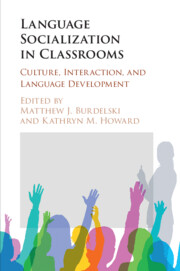Book contents
- Language Socialization in Classrooms
- Language Socialization in Classrooms
- Copyright page
- Dedication
- Contents
- Figures
- Tables
- Contributors
- Acknowledgments
- Transcription Conventions
- 1 Introduction
- Part I Socializing Values, Dispositions, and Stances
- Part II Socializing Identities
- 5 Learning to Be a Poet
- 6 Teaching Words, Socializing Affect, and Social Identities
- 7 Making the Familiar Change
- 8 Negotiating Epistemic Authority and Co-Constructing Difference
- Part III Language Socialization and Ideology
- Part IV Conclusion
- Index
- References
5 - Learning to Be a Poet
Chjam’è Rispondi in a Corsican School
from Part II - Socializing Identities
Published online by Cambridge University Press: 10 February 2020
- Language Socialization in Classrooms
- Language Socialization in Classrooms
- Copyright page
- Dedication
- Contents
- Figures
- Tables
- Contributors
- Acknowledgments
- Transcription Conventions
- 1 Introduction
- Part I Socializing Values, Dispositions, and Stances
- Part II Socializing Identities
- 5 Learning to Be a Poet
- 6 Teaching Words, Socializing Affect, and Social Identities
- 7 Making the Familiar Change
- 8 Negotiating Epistemic Authority and Co-Constructing Difference
- Part III Language Socialization and Ideology
- Part IV Conclusion
- Index
- References
Summary
This chapter examines language socialization practices in two Corsican bilingual schools surrounding ‘Call and Response,’ a poetic genre traditionally practiced by expert, male poets. Against the backdrop of language revitalization, ‘Call and Response’ emerges as a strategy that apprentices children to a form of socially recognized and valued linguistic expertise with a high affective and collective cultural content. At the same time, it involves the transformation of the practice itself as it is moved from individual, oral, and improvisational to collective, written, and adjusted to accommodate children’s levels of Corsican competence. The chapter details a researcher–teacher collaboration, tracing the process of text production in the classroom to field trips where the texts were performed. It shows that children are socialized to linguistic practice and to valued social and interactional stances that include the role of “poet” and the ability to engage in a style of joking exchange. It argues that the practices both presuppose traditional forms and create new forms of community around the use of Corsican and new understandings of what it means to be a “speaker” of Corsican.
- Type
- Chapter
- Information
- Language Socialization in ClassroomsCulture, Interaction, and Language Development, pp. 93 - 111Publisher: Cambridge University PressPrint publication year: 2020
References
- 1
- Cited by

